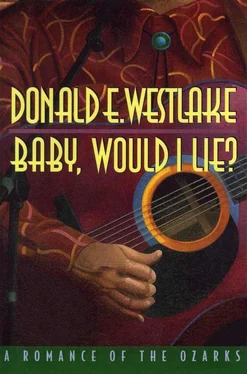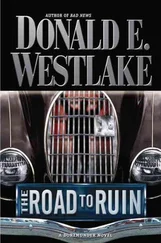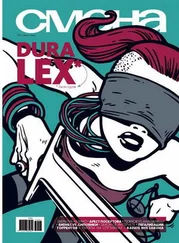The negotiations were stalled right now, mostly because of the murder trial, but that didn’t keep Jolie from going over every nuance of every word said by every participant at every meeting. Ray himself was staying out of those meetings, so he supposed he should be grateful to Jolie for taking the heat and just giving him the bits and pieces of the thing later, but Jesus ! No matter how vitally important this IRS case might be in his life, in truth it was goddamn boring to listen to, and whenever Ray got bored, he eventually got irritated as well, no matter how hard he tried to be good and mature and adult.
This time, he lasted about fifteen minutes, to and through Hollister, the village across Lake Taneycomo from Branson. “Enough, Jolie,” he suddenly said, rising from his seat, stepping forward into the well next to the bus driver, grabbing the microphone from the built-in sound system under the big windshield. Out front, a Ride the Ducks amphibian vehicle full of tourists rolled along amid the campers and station wagons like something in a Road Runner cartoon. Ray gave it a look, waved back at the kids in the rear row of the open-topped amphibian, then turned to face the bus interior, thumbed on the mike, and said, “Everybody awake?”
Moans and groans.
“Good,” Ray said. “Let’s rehearse the new one.”
More moans and groans. Ray leaned back, half-seated on the shelf under the windshield, while the troops unlimbered their instruments. He could see the girl reporter back there next to Cal — damn! lost her name again — all wide-eyed and eager. Sure, let’s give her something to write home about.
Speaking into the mike, Ray called to the new reed man, Jerry, the guy who was taking Bob Golker’s place: “Jerry, you know the IRS song?”
“I been studying it,” Jerry called back. He was a skinny roundheaded guy with glasses, very cerebral; not as much fun as the drunken Bob Golker, but a better musician.
In the front row, next to Honey Franzen, Lennie Elmore leaned over to say, “He’s got it, Ray; he’s a quick study.”
“Okay.” Ray grinned at his people, in his world. “For the benefit of the reporter among us,” he said, wishing he could remember the damn woman’s name,“let me explain the background on this song. I’ve been having a little income-tax trouble lately—”
Jolie snorted.
“—and we’re still talking it over with the government people. Now, sometimes I get my songs out of my own life, and this is one of them. We’re not gonna do this song in public until we’ve cut our deal with the feds, so, little lady, you’re getting a preview here.”
She didn’t like “little lady,” he could see that. Well hell, maybe he was gonna have to write her name down somewhere. Meantime, screw her. “All set, boys?” he asked.
They were all set. This had to be an acoustic version, of course, with no bass and the drummer doing his part on the practice pad on his lap, but they could still all work at familiarizing themselves with the idea of the arrangement. Ray gave the beat, they did the intro, and in he came, sailing on top of the music, belting it to the bus as though the bus were Yankee Stadium:
I’m singin for the IRS.
I got myself in a real mess.
It’s all my own fault, I guess;
Now I’m singing for the IRS.
I’m workin out here for the feds.
If I don’t, I’ll be tatters and shreds;
They own these great-lookin threads.
I’m bein’ dressed for you by the feds.
If you think your money’s yours, take my advice.
Before you spend a dime, sit down, think twice.
The revenooer’s auditors, they ain’t so nice;
Where we folks got a heart, they got a piece of ice.
I’m workin for the government man.
I’m doin the best that I can,
Goin along with his plan,
Workin for the government man.
They went through the song three times, the second time trying an idea of Lennie’s, in which the girls came in and sang counterpoint against him in the bridge, going:
He’s singin in the rain.
Won’t you let him explain?
He’s lost all his money, so
He’s broke again.
But Ray didn’t like it. It didn’t do anything for him, or the song, or the emotion, or the relationship with the audience. So the third time, they did it without the girls, and that was better. Then Ray borrowed Peewee’s guitar and walked down the aisle to the girl reporter and said, “You don’t want to hear the same damn song over and over.”
“I’m enjoying it,” she said, grinning at him. “I can see why you won’t take it public until after you make your deal.”
He laughed, having a good time with her. “This one’s also autobiographical,” he lied, and strummed the guitar and went into it:
It’s time to write another love song;
This time, the song’s for you.
It’s hard to write another love song,
Unless that song is true.
The heart that goes into a love song,
That heart just must he real.
The words that go into that love song
Must tell you how I feel.
I’ve written songs about most everything.
I’ve written happy songs and blue;
I’ve written songs I want the world to sing,
But none of them were you.
It’s time to write another love song,
An easy thing to do.
Every word I say will be my love song.
Because the song is you.
Finishing, he grinned at her, and she said, “Do you remember her name?”
“Ouch,” he said. “You got me, damn it. Tell me, and I’ll never forget it again.”
“Sara.”
“With or without the H ?”
“Without.”
“Lean and mean, huh, Sara?” With another good ole boy grin, Ray tapped his forehead. “I got you now,” he said, “right here in the old computer.”
“I like the IRS song,” Sara Whatsit said. “And I liked the fried-food song, too.”
“Maybe we’ll share some fried food together sometime,” Ray said, and bent to look past her out the window at the beginnings of Forsyth. “Looks like we’re here,” he announced. “Catch you later.”
“You, too.”
Feeling he’d done well enough for day one, Ray went back to his seat, returning Peewee’s guitar along the way, and looked out the big windshield at the mob clustered around the courthouse, dead ahead. TV camera crews, cops, tourists, reporters, all kinds of people. He said, “I never knew old Belle had so many friends.”
“You give them what they want,” Jolie said, “they’ll come out for it.”
“I guess.”
By prearrangement, a space had been held open for the bus, where Ray would have the shortest and quickest route across the clear space to the building. A brown-uniformed trooper waved them into this slot, with so many hand gestures and body movements, you’d think they were landing a 747. The bus bunked the curb at last, stopped, and the driver opened the door, letting in the roar of the crowd.
Standing, yawning, stretching, Ray said, “Showtime.”
“Kill, tiger,” Jolie suggested.
Ray was the first one off the bus. Cops were holding the gawkers back, but their noise was terrific. Another uniformed trooper, this one older and with spaghetti on his hat to show he was of more importance around here, stepped forward, very formal, and said, “Raymond Vernon Jones?”
Читать дальше







